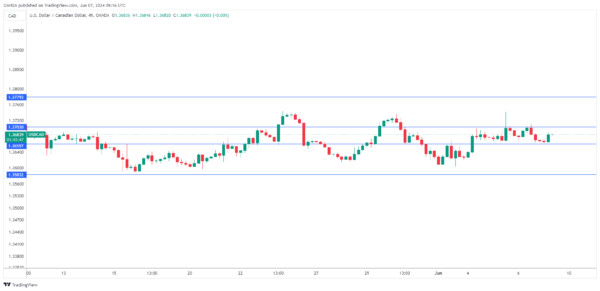The Canadian dollar has had a relatively quiet week and has ticked higher on Friday. In the European session, USD/CAD is trading at 1.3683, up 0.10%. We could see stronger movement from the pair in the North American session, when both the US and Canada release the May employment report.
Canada’s job growth showed an unexpected spurt in April, as the economy created 90,400 new jobs. This was the highest level in 15 months and crushed the market estimate of 18,000. The numbers were particularly encouraging as employment gains were felt across the economy.
The May report is expected to show a sharp drop, with an market estimate of 22,500. The unemployment rate is forecast to creep up to 6.2%, compared to 6.1% in April. The Bank of Canada will be keeping a close look at the job numbers, as it looks ahead to the next meeting on July 24th. The BoC took the plunge earlier this week and lowered rates from 5.0% to 4.75%. This was the first rate cut in over four years and comes as inflation has fallen to 2.7%, which is within the BoC’s “comfort level” of 1-3%.
The central bank’s inflation target is the midpoint of 2%, but as we saw this week, the BoC is prepared to cut rates even if inflation is above the target. The economy has slowed due to elevated rates and further rate cuts will boost the economy as well as provide relief to households that have been hit hard by sticky inflation and high mortgage payments.
The US releases nonfarm payrolls later today. This release is one of the most important events on the data calendar but has found itself overshadowed by inflation releases. Still, nonfarm payrolls is a market-mover that can have a significant impact on the US dollar. The market estimate stands at 185,000 for May, little changed from the 175,000 gain in April.
USD/CAD Technical
- USD/CAD is putting pressure on resistance at 1.3703. Above, there is resistance at 1.3779
- 1.3659 and 1.3583 are the next support levels










